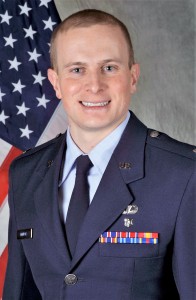Current and veteran military students bring field experience to health policy and management
February 23, 2016
Have you ever considered how the military oversees the health care of its vast network of current and former employees? Try to visualize it, and you may begin to see the natural fit between some military personnel and the field of health policy and management.
In the UNC Gillings School of Global Public Health’s Department of Health Policy and Management, there is a cadre of students made up of both active and retired members of the United States Armed Forces.
Capt. Joshua Monroe of the Air Force is among them, and makes the most of the military-public health connection.
“The Air Force allows me to attend school full time, so my daily schedule is very similar to that of the average graduate student,” Monroe says. “However, my learning is influenced by my exposure to military health care, and I’m able to apply my work experiences in the classroom. I’ll return to a military hospital upon graduation, so I am continually thinking about how to apply the skills I’m gaining as a student to the military healthcare environment.”
Monroe is one of three Air Force officers currently studying health policy and management at the Gillings School. He, Capt. Nathan Martin and Capt. Kelly Sampson all matriculated at the University of North Carolina through a highly selective graduate education and training program offered by the Air Force. For the past several consecutive years, at least one of the two officers selected annually for the program has chosen to study at UNC.
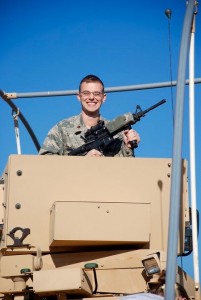
Nathan Martin poses in the turret of an armored personnel carrier in Kirkuk, Iraq. (Contributed photo)
“My primary duty in the Air Force is healthcare administration, so health policy and management was really the only choice for me,” explains Martin. “I joined the Air Force specifically to enter this field. It’s a great fit for my analytical skills, and I figured the rapid evolution taking place in the industry could give me an opportunity to make a real difference.”
Like her colleagues, Sampson is an officer in the Medical Service Corps. This role amounts to acting as a healthcare administrator within the Air Force, and covers such areas as patient administration, resources management and medical readiness.
“What brought me to the Gillings School,” Sampson shares, “is that UNC has a great program, a great location and a great reputation. The choice was easy for me. They are also very military-friendly.”
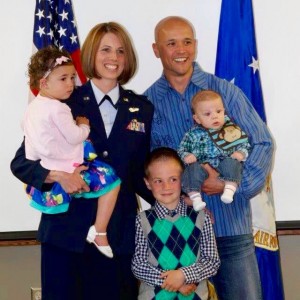
Kelly Sampson celebrates a promotion ceremony at Hill Air Force Base in Utah with her husband, Mirko, and their three children. (Contributed photo)
Not all the military students in the health policy and management department represent the Air Force. Shane Alexander is a veteran of the U.S. Coast Guard and a member of a proud military family.
During his five years of service, he drove an icebreaker on the Great Lakes, ensured regulatory compliance of commercial vessels as a marine inspector in northeast Florida and, ultimately, led the region’s Waterways Management Division in support of various marine safety missions.
After his service ended, Alexander wanted to find a perfect match between his unique skill set and his personal drive to support organizations with a humanitarian focus.
“In taking my father – an Army and Coast Guard retiree – to appointments, I gained exposure to the Veterans Affairs Healthcare System,” Alexander explains. “Taking into account my undergraduate degree, military experience and personal motivations, I realized a career with Veteran’s Affairs (VA) would enable me to leverage what I have to offer to benefit the very large VA patient population.
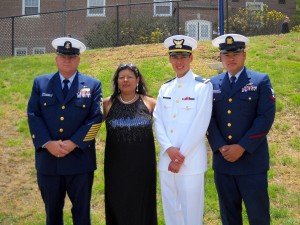
Shane Alexander (in white) invited his family to commemorate his 2009 graduation from the U.S. Coast Guard Academy and his commission as an Ensign. (Contributed photo)
“I chose to study at UNC,” he adds, “because the welcoming family environment blew me away. Faculty and staff here truly care about your professional growth, but they’re also invested in your individual well-being.”
Maj. Shannon Niki Stroud also studies health policy and management at the Gillings School. She was on active duty for seven years before transitioning to the Army Reserves in July 2014. In that capacity, she continues to support the Medical Service Corps.
Stroud has been stationed all across the U.S. – including in Alaska, where she met her husband – and she was deployed to Iraq and Afghanistan in support of Operation Iraqi Freedom and Operation Enduring Freedom.
Now, she enjoys learning how things work on the civilian side of health care while remaining close to her husband, who is stationed at Fort Bragg in North Carolina.
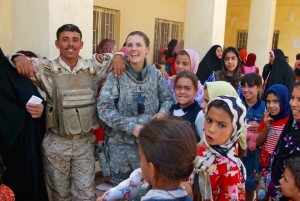
Shannon Niki Stroud (second from left) laughs with an Iraqi soldier and local schoolchildren during a humanitarian mission in Baghdad. (Photo credit: Capt. Jeff Wismann)
“I didn’t want to go to just any school or get just any degree,” Stroud declares. “I wanted to attend a top-rated program that could set me up for success in the healthcare sector. I’m still working out exactly which career path is the right one for me, but I do know that I will use my military experience and UNC education to help a healthcare organization flourish.”
In addition to these students, four other active and veteran members of the U.S. military currently study health policy and management at the Gillings School. These include Army Maj. Walter Hawkins, health services comptroller and student in the master of science in public health program; Army Lt. Col. Azure Utley, dental officer in charge of Smoke Bomb Hill Dental Clinic at Fort Bragg and student in the executive master of public health program; and Greg Page, Navy veteran, and Lt. Col. Keith Vollenweider, base clinic administrator at Laughlin Air Force Base in Texas, both students in the doctoral program in health leadership.
One bonus of UNC’s program that several of the students mention is its proximity to the VA Medical Center in Durham. In fact, one military veteran and 2014 graduate of the Department of Health Policy and Management currently works at that facility.
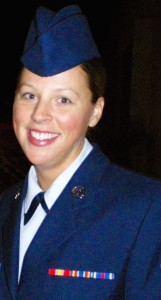
Marie Callahan, shown here in uniform in 2008, now works at the Durham VA Medical Center. (Contributed photo)
Marie Callahan, MSPH, RT(R), was a senior airman working as Korean linguist in the Air Force – until an injury cut her service short. After returning home to Charlotte, N.C., she completed studies to become an X-ray technologist. The whole time, she says, she continued to seek medical care through the VA, but faced great frustration as she dealt with chronic pain, heartbreak and administrative tangles on her journey to regain an independent lifestyle.
Eventually, Callahan reached her limits. Her health concerns continued to interfere with her career as an X-ray tech, and she decided to pursue an alternate path in healthcare administration that would enable her to prevent fellow veterans from experiencing what she had been through – or, at the least, would allow her to make the experience better for those worse off than she.
“Health policy and management seemed like the best way to pursue my passion,” she shares. “After graduating from UNC in 2014, I completed a yearlong fellowship and then took a fulltime position with the Durham VA. As the administrative officer for care in the community, my main responsibility is to coordinate care for our veterans through the new Choice Program.”
The Veteran’s Choice Program allows former military personnel enrolled in a VA healthcare system to receive medical services in their own communities, instead of waiting for a VA appointment or traveling to a VA site. Through her work, Callahan exemplifies the unique added value that military and veteran experience can bring to the field of public health.
“We have had members and veterans of the military in our graduate programs for more than a quarter century,” says Bruce Fried, PhD, associate professor of health policy and management and director of the department’s residential master’s program. “Over that span of time, we have consistently seen how these individuals enrich the education of their fellow students.”
Callahan is one of 24 active and veteran military students who have graduated from the health policy and management department in just the past five years.
“Members of the military serve as excellent role models of professionalism, teamwork, accountability and respect,” Fried elaborates. “Their experiences are often sobering, and redefine the meaning of working under stressful and uncertain conditions. Time and again, these students raise the level of classroom discussions from the theoretical to the painfully real, and their contributions affect and develop their peers on an emotional and cognitive level. This is everything that we, as educators, hope to see on a daily basis.”
Gillings School of Global Public Health contact: David Pesci, director of communications, (919) 962-2600 or dpesci@unc.edu

